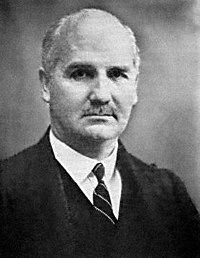Frederick Lindemann
|
The Right Honourable The Viscount Cherwell CH PC FRS |
|
|---|---|
 |
|
| Paymaster General | |
|
In office 1942–1945 |
|
| Preceded by | Sir William Jowitt |
| Succeeded by |
Vacant Next holder Arthur Greenwood |
| Paymaster General | |
|
In office 1951–1953 |
|
| Preceded by | The Lord Macdonald of Gwaenysgor |
| Succeeded by | The Earl of Selkirk |
| Personal details | |
| Born | 5 April 1886 Baden-Baden, Germany |
| Died | 3 July 1957 (aged 71) |
| Alma mater | University of Berlin |
| Known for | "Dehousing" paper Lindemann mechanism Lindemann index Lindemann melting criterion |
Frederick Alexander Lindemann, 1st Viscount Cherwell, CH, PC, FRS (5 April 1886 – 3 July 1957), pronounced /ˈtʃɑːrwɛl/ CHAR-well, was a British physicist and an influential scientific adviser to the British government from the early 1940s to the early 1950s, particularly to Winston Churchill. He advocated the "area" bombing of German cities during the Second World War and doubted the sophistication of Nazi Germany's radar technology and the existence of its "V" weapons programme.
Lindemann was the second of three sons of Adolph Friedrich Lindemann, who had emigrated to the United Kingdom circa 1871 and become naturalised. Frederick was born in Baden-Baden in Germany where his American mother Olga Noble, the widow of a wealthy banker, was taking "the cure".
After schooling in Scotland and Darmstadt, he attended the University of Berlin. He did research in physics at the Sorbonne that confirmed theories, first put forward by Albert Einstein, on specific heats at very low temperatures. For this and other scientific work, Lindemann was elected a Fellow of the Royal Society in 1920.
...
Wikipedia
